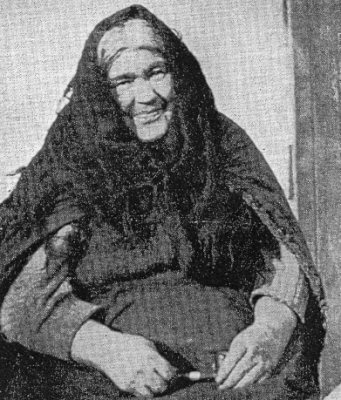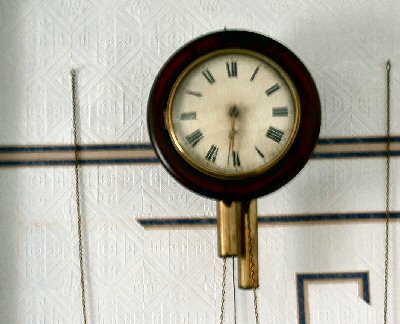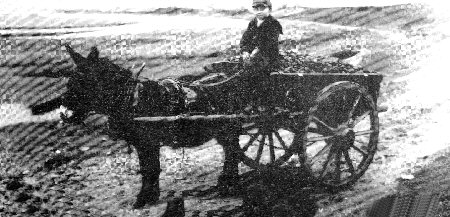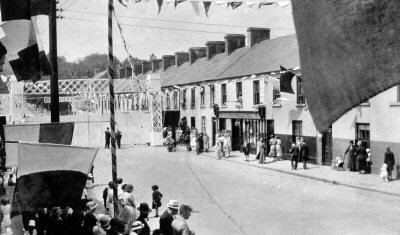‘She was a through-other oul’ bit an’ none too sonsy at that, for it wus often said she wus given till ridin’ a broomstick.
Month: March 2004
Fews Glossary, C
Caddie boy, good-for-nothing person
Cadge carry, ‘ye’ve had a long cadge o’ it’
Cadger little, sometimes applied to a pedlar
Cailey gossip, round of calls on neighbours
Call arrange, need, demand, right:
‘he’s called an auction’
‘you had no call to hit him!’
‘ * got the best call’ i.e. was in greatest demand
‘what call have ye to take that attitude?’
Called spoke with abuse: ‘he called me out a name’
Came on happened: ‘What came on ye?’
Cant Auction
Canty jaunty: ‘A canty boy, him!’
Cap to stop; a cover; takings from a collection
Care family; ‘look after my care’ i.e. wife and children
Carried away: foolish, vain
Carry on misbehave
Case-equal similar; ‘they’re case-equal on truth-telling’
Case-hardened accustomed; ‘she’s case-hardened till he’s ways’
Cast reject, reproach; ‘I cast that away’
‘he cast up her shortcomings to her face’
Casting-match quarrel
Causey the paved stones around the kitchen door
Cementing beating; ‘he got a well-deserved cementing’
Chanceable changeable
Chander scold
Change one’s feet put on dry socks/boots
Chap blow; ‘he wants a chap on the lug’ [he deserves hitting]
Charge load, caution; charge the gun; I charged him to be civil
Chattered bruised, shattered
Chats small; just chats of potatoes; wee chats like you!
Chay-cow a term used to soothe or call a cow
Check chide
Cheek impertinence
Cheep talk; ‘if he cheeps, he’ll rue it!’
Chew upon it think it iver
Childer children
Chitter mutter; ‘chittering there to yerself like a looney!’
Chivvy chase
Clabber mud
Clamp a covered heap [e.g. of potatoes]
Clart a slovenly, dirty woman; ‘that clart, is it ye were with?’
Clarty dirty, wet
Clash repeat
Clash-bag story-teller [pejorative] ‘the worst clash-bag in the area’
Clash blow; a clash on the face
Clat to scrape
Clock a hook, a thump; ‘I got a clock on the nose’
Clift wise; ‘he’s on’y half-clift’
Clinch agree, settle
Clip-blow a frolicsome boy or girl
Clipe a thump; also a tell-tale
Clitter-clatter idle talk
Cliver generous; ‘he’s cliver wi’ he’s money’
Clean quite; ‘he’s clean done!’
Clemmed perished; ‘clemmed wi’ cold’
Clods fragments of earth; also verb, to strike with …
Clocks beetles
Clocking brooding [women or hens] ‘What’s she clockin’ on now?’
Cloots feet
Close secretive, mean; ‘she’s a close one’
‘he’s that close, he’d starve ye and him wi’ plenty’
Clout rag, blow; ‘he’d a dirty clout for a hanky’
‘a clout on the head might mend he’s ways’
Clutch flock of chicks
Coarse rough, stormy; ‘a coarse fellow’, ‘a coarse day’
Cock up to set up, ruin
Cocked-up conceited; ‘a cocked-up upstart’
‘aisy cocked-up’ – easily flattered by praise
Cod a foolish person
Comic-cuts comic weekly like Beano, Dandy
Coggle shake
Cogly unsteady
Cold-rifed a person who suffers from cold
Colley soot smuts, as sometimes float round a room
Colloge gossip
Cogglety-corry see-saw
Condescend agree, assent; ‘she’ll condescend in the end’
Come at illicitly approach[ed]; ‘he was come at by the other side’
Come by respected; ‘he was well come by on both sides’
Come down drop caste; ”twas a come down for her till be marryin’ him’
Come in prove; ‘that’ll come in handy sometime’
Come round ‘he’s comin’ round’ [recovering] ‘he’ll come round to the right of it yit’ [accept the logic] ‘a man come round till his time of day’ [of his age]
Come over repeat; ‘he come over it again and again’
‘she can’t keep from comin’ over things’
Commerce dealings; ;have no commerce with him’
Connu-going easy-going
Con memorize
Consate pride
Conversible pleasant
Convoy large number; ‘a quare convoy there’
Accompany; ‘he convoyed me part of the way’
Cop catch; cop the ball, ‘he’ll cop it when he’s da comes home’
Copies capers; ‘never heed her copies’
‘cutting copies’ – acting silly
Cop pig a young pig fed by hand
Corn [heart of] kind, thoughtful person
Cornaptious disagreeable
Country crop rough, bowl-shaped haircut
Counted reckoned; ‘it’s not counted well to talk that way’
Coup upset; he couped the cart
Cove cave, souterrain
Cowe intimidate
Crab scold, [noun] short-tempered old woman
Crabbit adjective from above; ‘he’s that crabbit he’d differ from his own wife, if he had one’
Crack news; ‘what’s the crack?’
Short time; ‘I’ll be with you in a crack’
Cranch crunch
Crap crop
Creepy a low stool, usually on 3 legs
Crig stub, as in ‘toe’
Croak about to die
Crowlie the runt, smallest of the litter
Crucify annoy, hurt; ‘she’d crucify ye with her tongue’
‘these boots have me crucified!’
Cruddle curdle
Cruel fine, big, very; a cruel big girl, cruel rich, a cruel funeral
Cruel hand unfortunate person; ‘his troubles have made a cruel hand of him’
Crulge crouch
Cut many! ‘the dog cut me’ [bit] ‘a cut of bread’
‘a cut of hay’ [auction term] ‘draw cuts’ [lots]
‘I’ll niver cut mate in that house again!’ [eat a meal]
Cutty small; a cutty spoon/pipe etc. ‘a wee cutty’ [boy/girl]
Applied also to worn-out spades, knives etc.
Cure tonic; ‘you’re a cure for sore eyes’
‘he’s a tarribe cure’ [he is fun]
Curleys kale
Cute astute; ‘a quare cute wee man’: cute hoor – one of the stars of the Mahon inquiry!
Harl o’ bones wi’ no gumption!
‘The very childer used till be afeared till daunder on the hill in the heel of the evenin’. An’ no wonder. Shure it wus said the wee people wud be dukeing in sheughs ready till grab them. Many a mallyvogin I got meself because of them. An’ sure the cattle themselves wudn’t as much as munch a bite once darkness had come. Ay devil the blade wud they let in their gubs!
Damolly Mill
Up until a generation ago if one was fortunate enough to find work locally as likely as not one worked in the mill.
Damolly Mill closed down twenty five years ago, in 1979. For almost two and a half centuries it – under different guises – had provided employment and community life for ten generations of local people.
History of Newpoint Players
Newpoint Players [Newry and Warrenpoint] were formed in 1946 shortly after the war. For most of those years since, the drama group has produced at least one full-length play a year, frequently several other productions and has boasted a strong team of actors, producers and back-stage players. This is our most long-lasting, consistently successful and highly talented arts group, bringing fame and world renown to this little corner of the earth. The number of actors and actresses of stage and screen who owe their first chance to Newpoint is legion. Among the successful, talented and famous of the moment are John and Susan Lynch, Gerard Murphy, Sean Kearns, Peter Balance, and Gerard Rooney but there are many more. This short piece merely notes some milestones in Newpoint’s illustrious history.
Without doubt a talented, driving director is central to any amateur group. He/she will gather together kindred spirits and initiate a number of thespian projects. Before the triumph of television this was the only available form of public entertainment for the masses of people. Sadly the audience numbers has dropped over the years and the age profile has considerably advanced. However we had a few hundred season ticket holders this year – in line with recent years – and a full house for the home team. Newry’s audience is famous for its critical discernment and its warm welcome to visiting teams. Such an audience is central to success.
It is fitting before reviewing its almost sixty year history, to acknowledge that Newpoint today is stronger perhaps than at any time in its past. This is the more remarkable for the loss in recent years of stalwarts like Regina Hanratty and her husband, Owen Mooney, Derry Murphy and especially Sean Hollywood. The reason of course is that under the powerful tutelage of the latter a number of excellent people including Sean Treanor, Donal O’Hanlon, Geraldine Fitzpatrick, Declan McDaid, Susan Lynch, Pauline Lynch, Laurie Hodgett and Patricia McCoy have developed their talents in a variety of ways and directions. A few patrons including your humble scribe, were concerned about the group’s will to go on after Sean’s untimely death. We ought not to have worried. It is scarcely an exaggeration to say that Newpoint has gone from strength to strength, almost inspired to greater efforts by the absence of their former mentor.
Founder member and first director – an acclaimed actor and stage designer – was Livy Armstrong. His early team included Nancy Murphy, Ken Kenny, Marie Shortall, Jim Murphy, Mona Garland and Patrick Carey. Most of this successful crew was long-serving. Many early productions were Shakespearian – acknowledged as among the most difficult productions to undertake. In 1949 they played A Midsummer Night’s Dream. From 1950, under Patrick Carey’s direction – which was to dominate the Society for fifteen years – they produced Hamlet, Macbeth and The Merchant of Venice [Shakespeare], The Devil’s Disciple and The Doctor’s Dilemma [Shaw] Relative Values and Hay Fever [Coward] and many more. T P Murphy [of GAA, Shamrocks and HE fame] was club treasurer from the beginning up to 1960. Unbelievably Charlie Smyth started his Newpoint career more than 50 years ago, as did Owen Mooney. The wonderful Sam Russell from Banbridge, who recently featured in The Rose [Siobhan O’Duibhan] and who sadly died during last year’s festival, started too in the fifties and played Shylock in The Merchant of Venice in 1958. Dr Ted Wilson became Newpoint Chairman in 1957 and his wife Nora remained our leading actress for many years. From 1956 and for five years Mary Andress alternated with Patrick Carey as Newpoint producer. In 1958 Newpoint’s Arms and the Man won the Athlone based All-Ireland festival for the group for the first time. Mary also produced The Quare Fella [Behan] Playbill [Rattigan] and You Never Can Tell [Shaw].
In the early sixties Seamus Mallon [still today our M.P.] joined, as Mary Andress left Newry for good. Seamus directed Thornton Wilder’s Our Town, a production still remembered fondly by some members and patrons. It won everything, including the society’s second All-Ireland title. Thelma Marley became then, and for a long time remained the group’s leading lady. Other directors of the late sixties included Joan Cassidy [Poker Session and The Birthday Party] and Olga O’Callaghan [The Heart’s a Wonder]. The latter in 1965 saw Gerard Murphy’s debut. Liam O’Callaghan, our star from 1952, left and turned professional in 1968.
There was a Newpoint hiatus in the early seventies until Sean Hollywood was elected artistic director in 1976. The flowering that followed was truly stunning and space does not permit me here to list all his achievements. Suffice to say that this writer agrees with the general consensus that Sean Hollywood was our Man of the Century up until his untimely death. Drama was merely the first and chief one of his many accomplishments but in this field alone he became feted not just throughout Ireland and Britain but even wider afield. I knew of American parents who sent their children during vacation to Newry to join in Hollywood’s Youth Drama group! That of course, was merely his summer sideline. It was in his blood.
Sean had acted in Philadelphia Here I Come [1969] and others. Over the next decades some of his personal triumphs included Habeus Corpus [Bennett] 1979, John, Paul, George, Ringo and Bert [Russell] and One Flew Over The Cuckoo’s Nest 1981, Under Milk Wood [Thomas] 1982, Darkness At Noon [Koestler] 1984 – the latter being an amateur premier and a career highlight. Blood Brothers [Russell] celebrated Newpoint’s fortieth birthday. He formed the Youth Group in 1980 and dedicated much of the rest of his life to its development. It staged numerous successes. In 1991 Dundalk International Festival was won by Newpoint’s Brighton Beach Memoirs [Simon]. In the following year Marat-Sade [Weiss] won Ulster and, for the third time, the All-Ireland titles for Newpoint. Gerry McNulty designed the award-winning set, and remains at the heart of Newry’s musical and drama scene today, again designing the ‘Portian Coughlan’ set this month.
The following notes are based on Drama Festival programmes of former years exhumed from my personal collection.
24 years ago the Drama Festival Committee looked not unlike that of today, except for former members who have passed on. Included in their number were Violet Durkan, Eileen Mooney, Gerard McNulty, Ann Boyle, Margaret Nolan, Charlie Smyth, Sean Hollywood and Mr & Mrs Wilson. On stage Scott Marshall gave none of his ten awards to Newpoint who performed Hugh Leonard’s Summer. I remember this production well and enjoyed it. Derry Murphy shared the stage with seven other Newpoint players including Sean Hollywood, Kate Fearon, Joe Duffy and Donal O’Hanlon. Bart, under Alan Martin won with Ayckbourne’s Confusions.
Derry Murphy won best actress at Newry in 1981 with One Flew Over The Cuckoo’s Nest – but shortly after died in a freak motor accident. The team came third. Sean Kearns and John Lynch, soon to turn professional, were on stage too, as were Patricia Hollywood and Joe Duffy and a host of others. Alan Nicholl gave the premier award to 33 Players for Kennedy’s Children [Patrick].
In 1986 Newpoint had no entry in Newry Drama Festival, won by Guinness Players with A Streetcar Named Desire [Tennessee Williams]. By 1994 Newpoint was back to winning ways with Waiting For Godot [Beckett]. Declan McDaid, Joe Smyth, Sean Hollywood, Gareth O’Hare and Gerry Daly formed an exceptional, winning team. Bart came second.
This year [2004] in addition to awards already recorded, Newpoint won Best Sound [Michael Murphy] and best Stage Manager Trassa Davey. The group was also credited for most ambitious choice. We are labouring under a distinct embarrassment of riches! The future looks bright!
Cock of Slieve Gullion
‘Finn McCool was on the mountain this day with he’s wife, which of them I won’t be sayin’, for they do tell me he had more than one. An’ he was sore put about when he heared that the Scotchman wus comin’ an’ he jist after a wakeness of sorts an’ still shaky on his pegs. He’s wife though had her wits about her.
Anal Wedges
‘The most common excuse is that they ‘fell unto’ these objects. We frankly find that hard to believe, especially the bloke with a can of shaving cream wedged in his anal passage. There was three feet of battery wire firmly attached and wound round it. He didn’t even attempt an explanation of that! To be honest, we thought at first it was an even more perverse form of human bomb, and no doctor would approach him!
The spokesman for the University Medical Centre at Leiden in Netherlands warmed to his subject.
‘Sometimes it’s fruit, vegetables, bottles, billiard balls, a Barbie doll, candles or screwdrivers. This mania particularly afflicts men of between forty and sixty years of age.’
I don’t know why, but that last comment unnerved me somewhat!
‘But they can be of any age’ he continued, as if to reassure me.
Pulkowen
In the oul’ days when the Johnston’s were at Roxboro’ that [Pulkowen, a rock in Umericam Bog, near Silverbridge] was one of their beheadin’ stones.
An’ the blud-stains are upon it till this very day, an’ it’s few people wud pass it at night because of the ghosts that still be there. Five pounds a head they wur paid for all that went to Armagh or Dublin.
My Father’s Son
The three Pats, Gibney, Lundy and Kavanagh were chatting over a pint in the Railway Bar one evening – oh, all right, they had a pint each – and having exhausted the usual topics of the shortcomings of women, the latest football results and the price of hay, they finally got round to telling each other riddles. There was a problem here, for none was too sure exactly what a riddle was. Anyway, Lundy, the intellectual, began with the Riddle of the Sphynx.
‘What is it’, he says, ‘that walks on four legs in the morning, two in the afternoon and evening, but three at night?’
‘That doesn’t make any sense!’ snorted Gibney.
‘Sense or not, what’s the answer?’ the first went on.
Well, the other two wrinkled up their eyebrows in a pretence of thinking, but there was no way they’d ever come up with the right answer. In the end they just gave up.
‘It’s man!’ crowed Lundy, triumphantly. ‘Can’t you see? When he’s a baby, in the morning time of his life, he crawls on all fours. Then as a man, he walks upright. When he’s old, he needs a walking stick.’
‘Well, I hope yours makes more sense,‘ jeered Kavanagh, though, if truth be told, he was racking his brains to think of one when it’ud be his turn!
‘A house with neither windows nor doors, but golden treasure it holds within,‘ chanted Gibney, forgetting the rhyme but getting the gist of it just the same.
‘Now you’re just being silly! How cud there be a house with no windies or durs?’
‘You don’t know, is that what yer’re saying?’
‘What’s the answer yer’re lukkin’ for?‘ says the other.
‘The right answer, of course, ye hoor ye!’
They were bate, ye cud see. But they wudn’t own up. In the end, Gibney too had to explain.
‘It’s an egg. Isn’t it home to the chicken before she hatches? And it has no windies or durs. She has to break out. The yolk is the treasure!’
‘Here,’ says Pat, suddenly brightening, ‘which should ye say, ‘the yolk of the egg is white’ or ‘the yolk of the egg are white’?’
‘Eggs’ yolks ‘s yellar!’ shouted Lundy. ‘And I hope you don’t think you’re getting off that aesy!’
But Kavanagh had had a brainwave. He’d heard one weeks before from a man in a pub in Kerry, when a young lad had entered. He had said,
‘Brothers and sisters have I none, but this boy’s father is my father’s son’.
‘Yer talking in conundrums’, complained Paddy Lundy. He might have been for all he knew, but he stuck to his task.
‘All right, I’ll say it again for yous, ‘Brothers and sisters have I none, but this boy’s father is my father’s son”.
‘Aye, it’s a good one,‘ says Gibney. ‘Is it your round?’
‘Don’t try and change the subject. What’s the answer?’
‘There’s no question that calls for an answer!’ roared Lundy.
‘The answer to the riddle!’ he persisted.
‘What is it you want to know? Who’s the brother or sister, the grandfather, the father, the son or the Holy Ghost?’
‘Just give the answer,’ says Kavanagh, weakening, for he wasn’t sure himself.
They didn’t want to admit defeat. But there was nothing they could even guess. In the end, Kavanagh took pity on them and said,
‘Luk, yus wouldn’t know him anyway, for it’s this fella I met when I was on holiday in Kerry!’
[In case you are beating your brains out too, the ‘boy’ is the son of the speaker, so the boy’s father is the speaker: when he says ‘my father’s son’ he is referring to himself as that son, and obviously the second father is the first ‘boy’s’ grandfather. I hope that’s clear now!]





